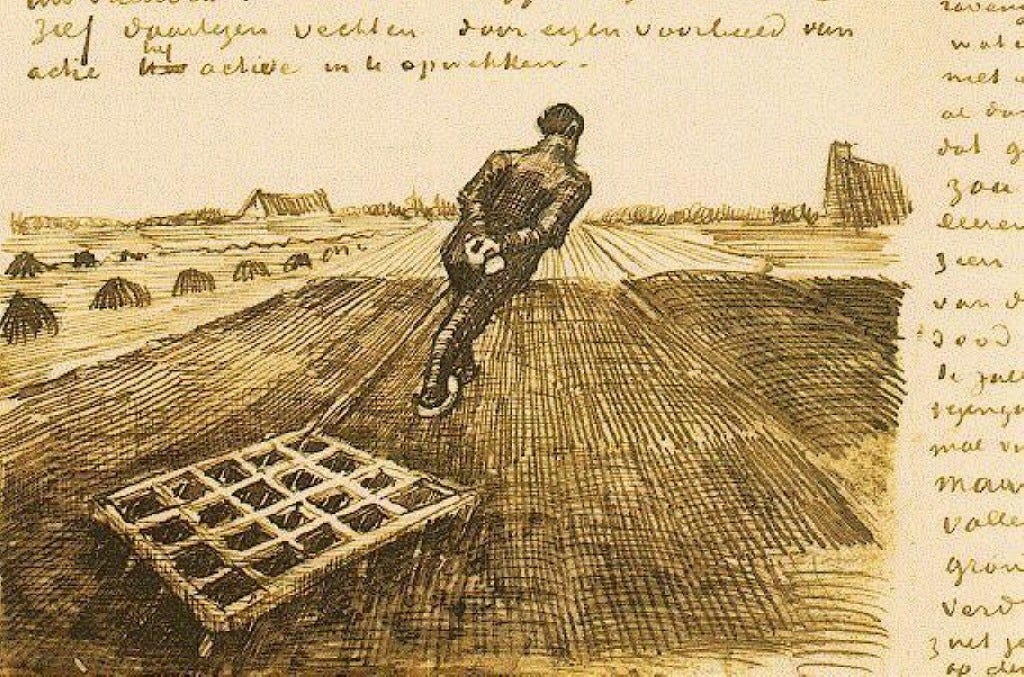(Find the writing prompt at the of this piece).
Van Gogh’s Words
The sun sets at 4:30, and we are still nearly three weeks from the shortest day of the year. Why does this winter seem darker and colder than all the others?
Something about the winter weather has always brought melancholy. When I was young it didn't bother me; I would play in the snow until my mother called me in. Solitude and the blue light of dusk never made me feel lonely. But now, it makes me wish for rain. Wind. Anything but the cold stillness. The heat clicks on endlessly it seems. The windows stay tightly shut. I do my best to nurture a few scraggly house plants, delighting when one sprouts a new leaf, then worrying I will kill it.
It's the news, I tell myself. My best friend is a doom scroller, and I'm concerned by how it will affect him, but am I any better, listening to NPR and the BBC, taking in Trevor Noah's daily blasts as if I could laugh my way out of this.
I should get out more, hike up to the top of Mt. Davidson more often, take advantage of the drought, take in the view. Riding this exercise bike only adds to my feelings of solitary confinement. It's like being in Black Mirror episode, only there's no plot. An unfinished script. A trailer on loop.
The projects keep stacking up, but one has to have the energy to complete them: adding the castors to the bottom of the Rosewood cubes, painting the walls with the samples, burnt orange and custard, that I've had for weeks. And there's the new red and white shelf paper that reminds me too much of Christmas, still sealed in their tight rolls in the closet, and the piles of notebooks, dog eared, marked with post it notes, neglected stories and poems always patiently waiting.
Why do you have to always be productive? I asked myself just yesterday. Wasn't it the writer Brenda Ueland who said we are always hurrying, when we should be dreamy and lazy? Lie down with a book, I tell myself. Rest.
Some days I can see the other side. It's a year from now, and the new couch is here, and the rosewood cubes are topped with the marble slabs I've had cut, and vaccinated writers are settling in to write with me again. The walls are a new color, there's a new book being edited, and I have lost this pandemic weight. Maybe it's 18 months? Please don't tell me it's two years. I don't know how I can even do this for one more year, let alone two.
Today, I heard a piece from on the media about the Spanish Flu Pandemic. There was very little written about it, and practically no literature or poetry, no films. It's curious, the host said. I wonder why. But so many children died during that pandemic, and young men and women. It didn't affect the elderly as much. It's curious, the researcher being interviewed said. But it was clear to me, and I said it out loud: they were so traumatized they couldn't find words for it. I vow to break that chain with so many other artists. I'm going to keep writing and writing and writing, even on the darkest days.
The writing prompt that inspired this post was this series of excerpts from his unintended autobiography, Dear Theo: Intimate Letters to his Brother © 1937
. . . pain, which sometimes fills the horizon. . .takes on the proportions of a hopeless deluge.
About this we know very little
it is better to gaze at a field of corn, even in the form of a picture.
We are still far from the time when people will understand the curious relations, which exist between one fragment of nature and another
Some, however, feel it silently, and that is something.
Try to walk as much as you can, and keep your love for nature
Painters understand nature and love her and teach us to see her.
If one really loves nature, one can find poetry everywhere.
I have nature and art and poetry, and if that is not enough, what is enough?
Patience, you will tell me. And I must have it.
I have been painting in the cornfields in the hottest part of the day.
I notice the sun sometimes has a strong effect on the grain, which soon becomes very yellow.
How lovely yellow is!
the cicadas are singing fit to burst—a harsh cry, ten times stronger than that of the crickets—
and the burnt-up grass takes on lovely tones of old gold.
a sun flooding everything with a light of pure gold.
I know well that healing comes—if one is brave—from within
Grief must not gather in our hearts like water in a swamp.
Patience, you will tell me. And I must have it.
The olive trees are old silver, sometimes nearer blue, sometimes greenish, bronzed
whitening over a soil which is yellow, rose, violet-tinted or orange, to dull red ochre.
towards sunset it generally grows a little calmer; then there are superb sky effects of pale lemon
I got up at night to look at the country. Never, never had nature seemed to me so touching and so full of feeling.
and the mournful pines with their silhouettes stand out in relief . . .with effects of exquisite black lace.
I have nature and art and poetry, and if that is not enough, what is enough?
violet hills in the distance, are so beautiful
These days are like a fresh revelation of color to me.
This morning I saw the country again after the rain—quite fresh
I have a new period of light before me.
all the flowers
the cicadas. . . abide; and here they still sing in ancient green.
And the blue sky never tires me.


